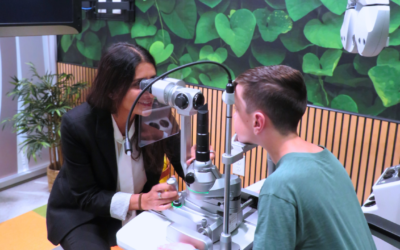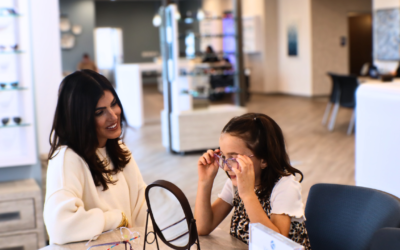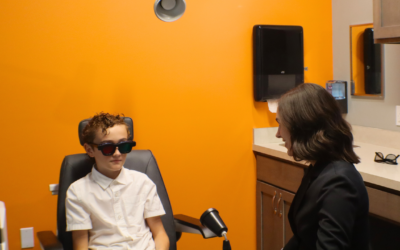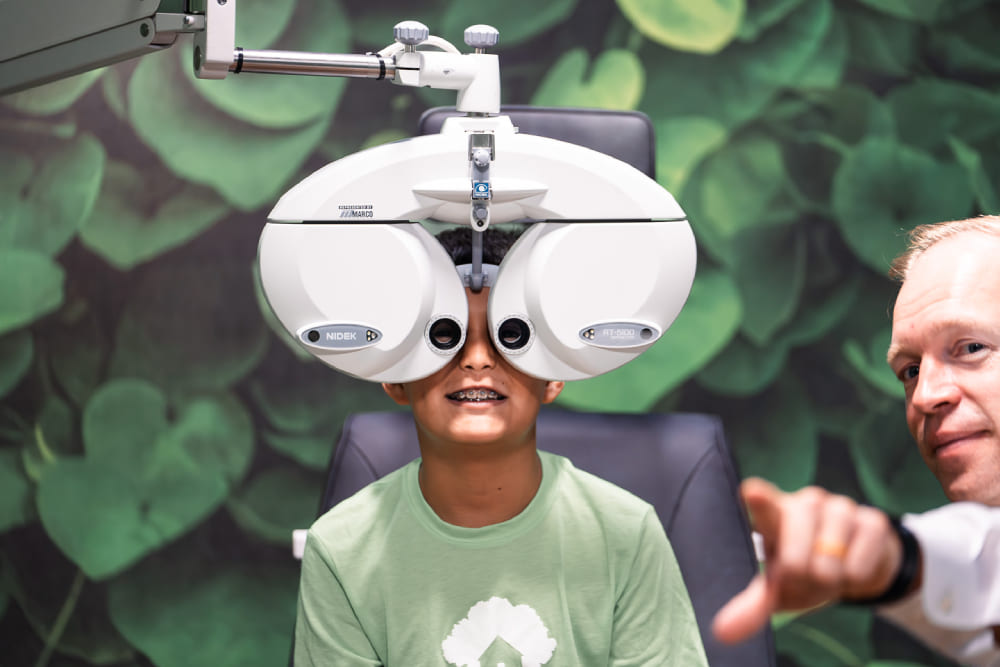
At VisionQuest Eyecare, we specialize in advanced myopia management to help children maintain clear vision and prevent future eye health complications. Our dedicated team, led by Dr. Chris Browning and Dr. Gaia Hess in Greenwood; and Dr. Anjali Shah and Dr. Nick Bantz in Fishers, utilizes state-of-the-art technology, industry-leading expertise, and customized treatment plans to slow myopia progression effectively.
Through our partnership with Treehouse Eyes®, we provide cutting-edge solutions designed to not only correct vision but also minimize long-term risks associated with high myopia. From early diagnosis to ongoing monitoring, we are committed to giving your child the best possible vision for a lifetime of success in school, sports, and daily activities.
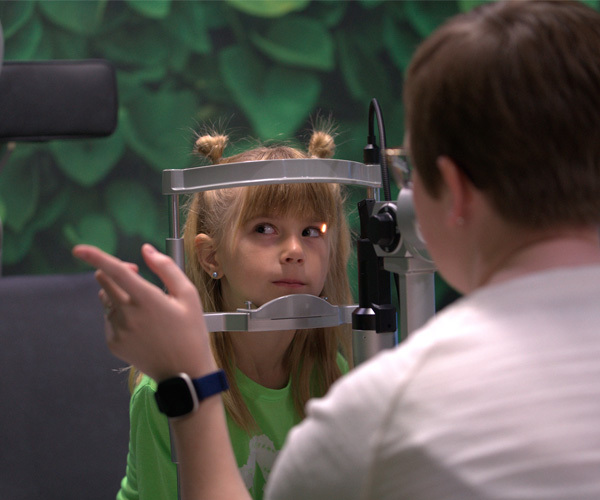
Why Is Myopia Management Important?
Myopia, or nearsightedness, is more than just needing glasses—it’s a condition that worsens over time if left untreated. As the number of myopia cases rises each year, children are experiencing progressively stronger prescriptions and increased risks for serious eye diseases, including:
- Retinal detachment – A sight-threatening condition linked to high myopia
- Glaucoma – Increased eye pressure that can lead to vision loss
- Early cataracts – Clouding of the eye’s natural lens at a younger age
Beyond eye health, worsening myopia can impact a child’s academic performance, sports participation, and daily life. While glasses improve vision temporarily, they don’t stop myopia from progressing—but our customized treatment plans do.
How Myopia Management Works
The sooner myopia is detected, the better we can slow its progression and protect your child’s long-term vision. Our experienced eye doctors develop a personalized treatment plan that focuses on:
- Slowing myopia progression to reduce future prescription strength
- Minimizing risks of eye diseases associated with high myopia
- Providing long-term vision stability for school, sports, and daily activities
Even though myopia cannot be completely cured, early intervention with VisionQuest’s proven treatments can significantly reduce its severity and preserve your child’s eye health for the future.
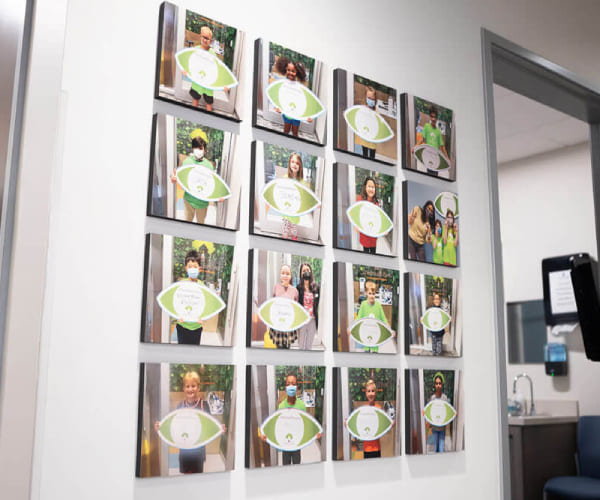
Our Myopia Management Solutions
At VisionQuest Eyecare, we offer the latest advancements in myopia control to ensure the best outcomes for your child. Our partnership with Treehouse Eyes® allows us to provide the most up-to-date, research-backed treatments available.

Ortho-K
Ortho-K lenses are custom-designed for each child and gently reshape the cornea while they sleep. By wearing these lenses overnight, children can enjoy clear vision throughout the day without needing glasses or daytime contacts. Ortho-K not only improves vision but has been clinically proven to slow myopia progression effectively.
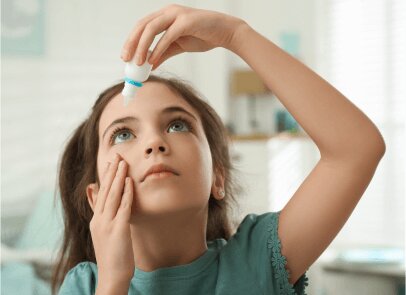
Atropine Eye Drops
A low-dose prescription of atropine eye drops can significantly reduce the speed of myopia progression in children. These drops are applied before bed and can be used alone or in combination with other treatments, depending on your child’s needs.

Multifocal Contacts
Soft multifocal contact lenses provide clear vision at multiple distances while actively reducing the progression of myopia. These customized lenses correct nearsightedness while influencing how light focuses on the retina, helping to slow the eye’s growth over time.
Ortho-K
Ortho-K lenses are custom-designed for each child and gently reshape the cornea while they sleep. By wearing these lenses overnight, children can enjoy clear vision throughout the day without needing glasses or daytime contacts. Ortho-K not only improves vision but has been clinically proven to slow myopia progression effectively.
Atropine Eye Drops
A low-dose prescription of atropine eye drops can significantly reduce the speed of myopia progression in children. These drops are applied before bed and can be used alone or in combination with other treatments, depending on your child’s needs.
Myopia Glasses
Soft multifocal contact lenses provide clear vision at multiple distances while actively reducing the progression of myopia. These customized lenses correct nearsightedness while influencing how light focuses on the retina, helping to slow the eye’s growth over time.

Why Choose VisionQuest for Your Child’s Myopia Care?
At VisionQuest Eyecare, we prioritize patient comfort and family-friendly care. From our welcoming environment to our cutting-edge diagnostic tools, we make every step of your child’s eye care journey as easy and effective as possible.
- Expert Pediatric Myopia Specialists – Our doctors, Dr. Chris Browning and Dr. Gaia Hess in Greenwood, and Dr. Anjali Shah and Dr. Nick Bantz in Fishers, have extensive experience in treating childhood myopia.
- The Latest Myopia Treatments – Through Treehouse Eyes®, we offer the most advanced, research-based myopia management solutions.
- Customized, Child-Friendly Approach – We take the time to explain treatments in simple, easy-to-understand terms, ensuring both parents and children feel comfortable.
- Proactive, Long-Term Care – Myopia management is an ongoing process, and we are committed to monitoring and adjusting treatments as needed to ensure the best results.
Schedule Your Child’s Myopia Consultation Today
The earlier myopia is addressed, the better the outcome for your child’s long-term vision. VisionQuest Eyecare is here to provide the highest level of care and personalized treatment plans to help slow myopia progression.
Book an appointment today at our Greenwood or Fishers locations to start your child on the path to healthier vision.
Related Blogs
The Best Ways to Treat and Manage Myopia in Children
If your child’s nearsightedness (myopia) worsens each year, it’s important to take action early. Myopia is not just about needing stronger glasses—unchecked, it can increase the risk of serious eye conditions later in life, such as glaucoma and retinal detachment....
How to Manage Nearsightedness (Myopia) in Children and Prevent Progression
Nearsightedness, or myopia, is one of the most common vision conditions in the U.S., affecting over 30% of the population. Among children, it is a growing concern, with an estimated 20-25 million experiencing myopia today. If your child struggles to see distant...
Can Screen Time Make My Child’s Myopia Worse?
As technology continues to become an integral part of daily life, children are spending more time on screens than ever before. Whether it’s for online learning, gaming, or entertainment, prolonged screen use has raised concerns about its impact on children’s eye...


